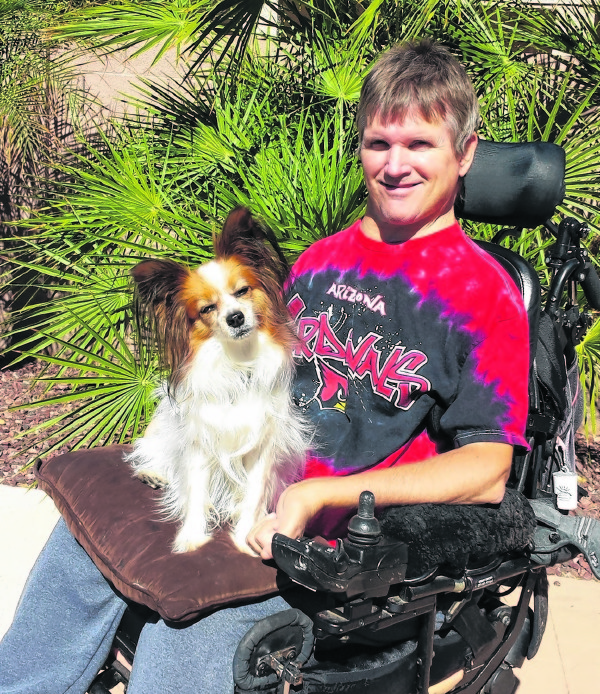
By Joyce Coronel
Greg Wickenburg has a dream. No, he doesn’t want to fly to Maui or hurtle through space on a trip to the moon.
Wickenburg wants to be able to drive himself to a friend’s house. Or the doctor’s office. Or even the dog park so his faithful companion, Roo, can bark and run and play.
Thirty years ago, as a teenager, Wickenburg was in a serious car accident that left him paralyzed. A C/5 quadriplegic, he’s spent the last 30 years in a motorized wheelchair. Most days, he reads books on his Kindle or watches television. Once a week, he goes to one of the doctors who specializes in his care.
“I am paralyzed from the shoulders down but I can move my biceps. I can’t straighten back out without gravity. No wrist, no fingers. So it’s just my arms that can move a little bit,” Wickenburg told Wrangler News.
His caregivers, his mother and his sister, won’t always be there, he knows.
“Being so dependent on others to take care of my needs, driving me to weekly doctor’s appointments — the idea of being able to go somewhere by myself would be life-changing. They can’t drive me around forever,” Wickenburg said.
Dr. Mark Wilson of Chandler has been Wickenburg’s family practice physician for 10 years. Both men love dogs, so when Wickenburg showed up with Roo, there was an almost instant connection.
“No matter how good he feels or how bad he feels with his different symptoms, he’s always come in with a smile and, actually, a pretty good attitude,” Wilson said. “And you don’t see that very often with patients very often nowadays.”
Wickenburg recently found out about a van that’s been adapted so quadriplegics can drive.
Joanne Wickenburg, Greg’s mom, remembers how she felt when she saw her son test-drive the vehicle. It was the first time he’d taken the wheel in 30 years.
“I just cried watching him go up the street. It was intense,” Joanne said. A van that he could operate on his own would be “the best thing that ever happened to him,” she added.
Wickenburg’s current vehicle, a 1995 Ford Windstar van, is on its last legs. It’s starting to cost more in upkeep than it’s worth, he said.
“My current van actually broke down and had me stranded twice when we first moved here,” Wickenburg said. That was before the family had a cell phone. It was 110 degrees outside and they weren’t close to anyplace that might offer help. Fortunately, a police officer came to their assistance.
The second time the van broke down, the Wickenburgs wound up near a family that was just moving in. They were able to hang out for a few hours while they tried to find a taxi that was wheelchair accessible.
One of the issues Wickenburg has been having is that the air conditioner in his current van blows cool air up front — but not in back where he sits.
Spinal cord injury patients don’t control their body temperature well, and getting overheated causes something called autonomic dysreflexia, which leads to soaring blood pressure, pounding headaches, and a nasty sense of claustrophobia. Any discomfort can cause this, but pain and overheating are the most common.
Greg started a GoFundMe campaign in hopes of getting a newer van.
“My goal is to raise enough funds to help get a new van, or (at least) a newer van. But my dream is to maybe get a van I can drive myself,” Wickenburg said. “If I could actually do it, I think it would be life-changing.
“Just to be able to go somewhere by myself, go to even doctor’s appointments. It’s been a long time since I’ve been able to go anywhere by myself other than taking the dog for a walk.” Wickenburg was a junior in high school when he suffered the devastating injury.
Is it really possible or even feasible for a quadriplegic to drive himself around? Wilson thinks so.
“He probably can’t drive in major traffic, but to have the ability to see me or see the neurologist or the other specialist would give him more independence.
“That’s huge,” Wilson said.
“It would be an ego boost. He’s not that old. Look at what we’re doing with the VA guys that are blown up …they get a leg, they get an arm, they do a lot of (physical therapy)—they get them strong and then they can go skiing, they can go fishing, they can hike Mount Everest. It’s attainable.”
Wickenburg, Wilson added, is a gracious person.
“He almost always says thanks at the end, and not many patients do that. Greg’s the opposite. The last thing is for him to beg… He would benefit and his quality of life would be much better. It will take a while but it’s something that he can do,” Wilson said.
Would-be donors can visit Wickenburg’s GoFundMe page at gofundme.com/qe6wk5jg. They can also drop off checks at Chase Bank. The account number 779510705 should be included on the check.
So far, Wickenburg has raised just $3,200. A reliable, wheelchair-accessible, used van would cost $30,000. A newer model with a power ramp system costs about $65,000. For the version with the addition of a joy stick that would allow him to drive independently, the price tag is a bit higher: $150,000 – $175,000.
“I think one reason the funds are coming in slow is the cost just scares people away. I would like people to know that every little bit helps,” Wickenburg said.
“If I can get enough to help with even a newer used mini-van it would be greatly appreciated.”

